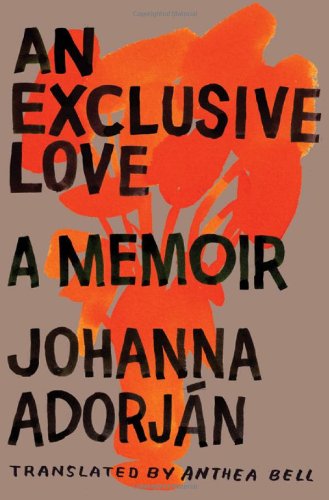The glamorous couple — he an orthopaedic surgeon and she a complex and temperamental music lover — spent many years at the mercy of history, surviving the Holocaust only to be forced to flee their home in Stalin’s Budapest, eventually settling in Denmark. Their lives together were marked with unimaginable challenges, but each they faced together.
Pista and Vera’s second-to-last challenge came when an ailing Pista was told he was terminally ill, leaving a troubled Vera to contemplate living without him for the first time since they were separated during the Holocaust. Her immense fear led to the couple’s final major challenge — deciding how they would kill themselves.
Their granddaughter Johanna Adorján was twenty when their bodies were found in bed, holding hands, in 1991. She suspects that it was her grandmother, then 71 and in perfect health, who orchestrated their final act of overdosing on a cocktail of pills, which were prescribed by Pista.
In her gripping memoir, An Exclusive Love, Adorján pieces together her grandparents' final day, based both on her own speculation and clues left behind by her grandmother who meticulously cleaned her home, wrapped presents for family members and friends, paid her bills, and wrapped her beloved roses for winter on her final day, attempting to lessen the burden left behind on her family.
These scenes weave together with scenes from Pista and Vera’s lives together, as Adorján recalls her own experiences with her grandparents, as well as those of family members and her grandparents’ surviving friends.
It would be easy to romanticize this true story, but Adorján is rarely, if ever, sentimental. She uses her experience as a journalist to peel away the layers of her grandparents’ secretive cloak, unfortunately failing more often than not. The former journalism student and amateur family historian in me begged for more facts.
“I say that as far as I know [my grandmother’s father] was an engineer. Inga shook her head, no, no, he went to sea,” writes Adorján. “[Inga] laughs. I suspect that my grandmother may have thought this version up because she liked it better. Or perhaps he really had been a naval officer in the First World War? And doesn't the navy need engineers? However, who knows how it really was!”
I desperately wanted to know how it really was. I wanted to hear about Adorján carefully poring over naval records to find the truth. I wanted to hear that she lost sleep trying to find answers to all her questions. I wanted her to follow the steps that surely I would have taken if I was trying to solve a family mystery (or many of them). If the records didn’t exist after the First World War than I wanted to know why! Were they burned? Missing? Lost forever? I hate to take the words of another reviewer, but the Toronto Star’s James Macgowan chose the perfect word when he used “skeletal” to describe certain aspects of the book.
Despite this, I was hooked, reading all of An Enduring Love in just two sittings. Just like Adorján was captivated by her mysterious grandparents, I was too, as I constantly danced between whether their decision was noble and brave or tragic and cowardly. They forced me to ponder many uncomfortable questions, among them “What would I do today if I knew it was my last?” and “What would life be like without the one that I love?”
An Enduring Love may not have been a perfect book for us who crave facts, but it was something else — reflective and stirring, but at times completely uplifting.


No comments:
Post a Comment